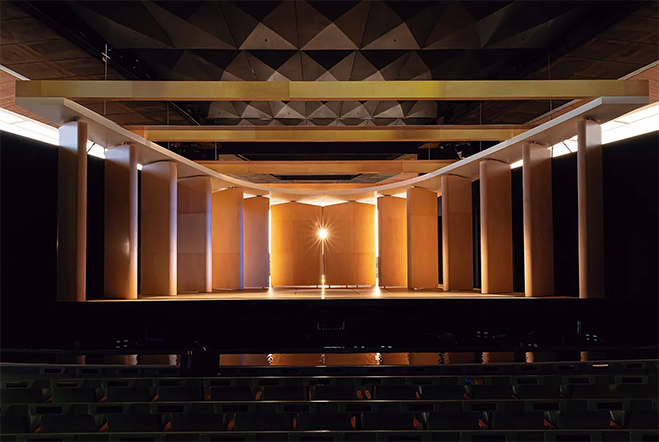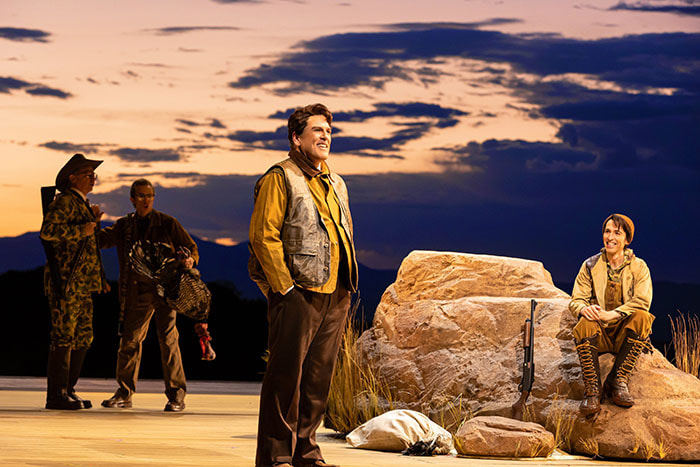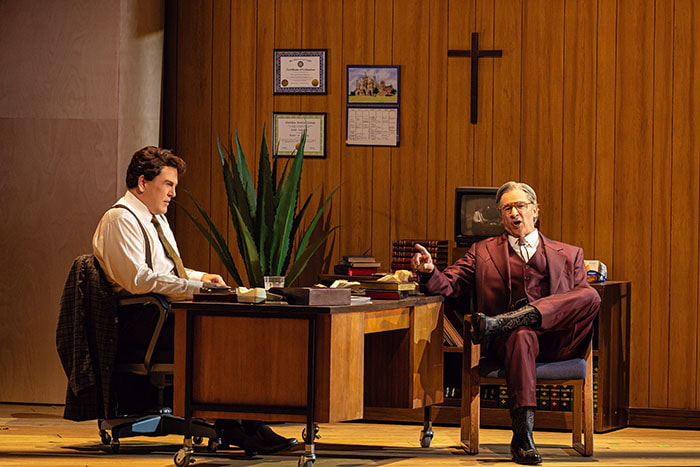|
Tenors in cowboy hats, y'all. By Zach Hively Every now and again, you get the calming reassurance you need that, in this big ol’ world of ours, filled with billions of people, I really DO have main character energy. Or, as I’ve decided those of us in the opera business will now call it, title role energy. Because this is how it normally goes for us writers: we sit at home, and we jot down our little pieces, and sometimes one or both of our parents actually reads one of them. And then someone asks us why we even bother because AI will surely put us out of a job, and then we laugh, because THIS is when someone finally decides to call what we do a “job.” But this is not how it goes for me. For me, it goes like this: I write a piece about attending the Santa Fe Opera, which is the opera house with the most title role energy in Santa Fe. I send it into the world, and then I forget about it, because it does not do to dwell on past triumphs. But then, the Santa Fe Opera shows greater technical aptitude than your standard nonprofit organization, because they clearly know how to use Google or literally any other internet reading tool to find stories written about itself. (We’ve all Googled ourselves. Don’t pretend otherwise.) The Opera’s representatives contacted me via my editor, which is the very sentence every aspiring writer dreams of saying to justify not going to business school. They lured me back to the Opera with press tickets and perhaps a whisp of a hint of a chance of a promise of another glass of prosecco, in exchange for contemplating another story for SEO optimization purposes. The last time I went, I saw an unforgettable classic opera, Don something or other. This time, the opera was unforgettable because no one had yet had a chance to remember it. It doesn’t get any newer than a world-debut production, and I can now forever tell other people’s children that I was there when the operagoing public saw The Righteous for its sixth showing, by which time the cast and orchestra really seemed to have worked out any possible kinks but not yet grown complacent enough to improvise. The opera in general, and the Santa Fe Opera in specific, is known for sparing no expense. Except this time, it spared some key expenses, likely to fund all these press tickets they’re dishing out. At times, as in the opening scenes of The Righteous, the production did away with set design almost entirely. They opened up the back of the stage to reveal the stunning natural landscape outside Santa Fe, New Mexico, which stood in for the stunning natural landscape of the unspecified Southwestern state in which the opera takes place. This innovation reveals the creative savvy required in selecting these operas for production, because if this one had been set (as so many operas are) in Ohio, the crew would have blown most of its budget bulldozing the mountains behind the opera house. Now I don’t know if other creative choices were based in any way on how many opera resources had to be earmarked for the prosecco for authors and their guests. Perhaps including non-stereotypical elements in the production saves dough at the opera warehouse. I don’t even know what a soprano is, or which of the Three Tenors I might have seen, let alone how staging decisions work. But I do know that this opera subverted what I, now a professional opera writer, expect from an opera. For starters, I did not know that an opera’s chronology was allowed to overlap with my own lifetime. The Righteous is set from 1979 to 1991, following the career of an enthusiastic young preacher who gets pressured into running for governor; in the words I scribbled in my notebook in the dark, which I can barely read, it looks like one character remarks, “Like any good politician, he says he doesn’t want to run.” David, the minister, would have been the title role if this opera had been named Righteous David, which it was not. Yet he still carries big-time title role energy. He turns out to be like any other Typical Man; he breaks the heart of his best friend Jonathan, he cheats on his wife Michele with his parishioner Sheila, and he does, with these qualifications, become governor. At a more typical opera, I would have relied on subtitles to decipher these plot points, as well as the emotions in the performers’ voices evoking the nuances of character development. But this—this opera was in English, which proved to me that anyone, with any lack of high culture in their background, can go to the opera and understand from the get-go that they can’t decipher opera singers no matter what language they use. That’s not entirely fair. There were some times I could absolutely understand what the performers were singing, because in these times I could read the subtitles faster than they could sing. And they used words in ways I did not expect operas were allowed to use them. One line, as I wrote it in the dark, said: “He can’t tell his own ass from a manhole cover.” If ever a teacher wishes to get high school students interested in the opera, I might suggest studying dialogue like this. The themes in the opera were really what defied my expectations, though; it touched on matters that felt much more relevant and in tune with today than the things I tend to think belong in operas, things such as horned Viking women and another one of those Three Tenors. This opera, for example, had late 1970s wood paneling and brickwork in its on-stage church offices, a look that had not yet been renovated into oblivion by the time I was entering my first office buildings in the real world. It had functioning TVs. It had discussions of oil being the future of our economy, emotional revelations of domestic abuse, throughlines of the interwoven “separation” of church and state, characters struggling to express sexual non-conformity, racism shaping public policy, and men in cowboy hats.
The Righteous didn’t have a lot of clear resolutions to these very real, very contemporary issues. But it made me ask more questions. Questions about why this story set in the 1980s matters today. Questions about what actually belongs in the theater. Questions about how we can break out of traditional operatic roles and tropes to see a greater swath of humanity interpreted and presented on stage. I wonder now—and why not—if absolutely anything is fair game at the opera. I mean, they let ME in the door, me and all my undeniable title role energy. This might be the great power and gift of operas like The Righteous: if I belong at the opera, everyone else deserves to see themselves and their concerns represented, too. Stay tuned for the next time Opera Man returns to the opera, presuming the opera hasn’t
0 Comments
Your comment will be posted after it is approved.
Leave a Reply. |
Submit your ideas for local feature articles
Profiles Gardening Recipes Observations Birding Essays Hiking AuthorsYou! Archives
October 2025
Categories
All
|



 RSS Feed
RSS Feed